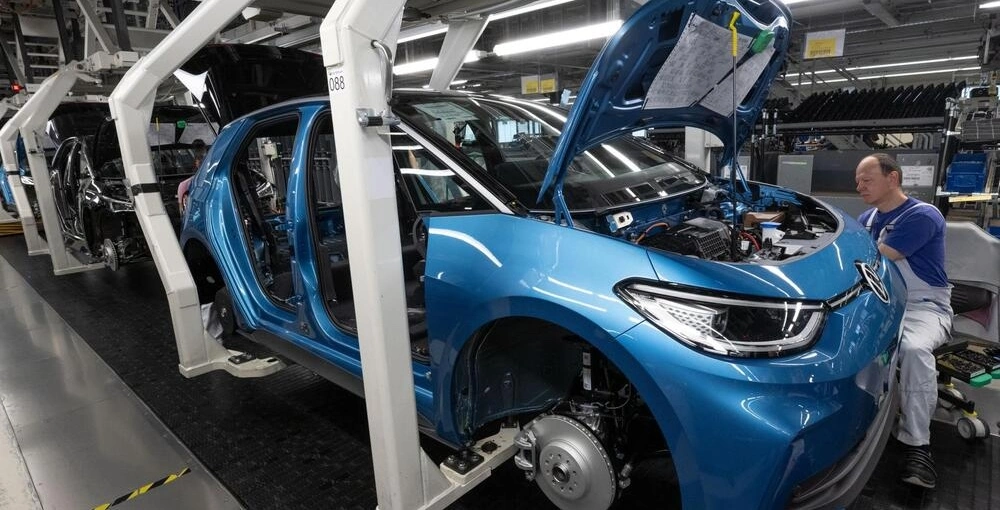Undoubtedly, the complete elimination of the environmental bonus last December continues to impact the registrations of zero and low-emission cars in Germany.
According to the latest figures published by the German Association of the Automotive Industry (VDA), in the first quarter of 2024, new registrations of battery electric vehicles (BEVs) fell by 14 per cent, while the ones for plug-in hybrid electric vehicles (PHEVs) increased by just under 20 per cent.
In total, 81,300 BEVs and 45,000 PHEVs were registered, which is five per cent less than the same period last year.
However, if only the last month is taken into account, this decline was 22 per cent, with 47,410 units sold in March.
BEVs recorded 31,380 units, nearly 29 per cent less than the same month last year, and the PHEV segment also “fell into the red” despite the still positive year-over-year development.
In March, 16,020 plug-in hybrids were registered, almost 5 per cent less than in March 2023.
According to the association, this is not only due to the withdrawal of the incentive but also because the last month had three fewer working days available compared to last year.
This impacts both production and exports as well as incoming orders.
However, what does the rest of the sector think?

“The collapse in the number of new registrations of BEVs has clearly confirmed the difficult situation we are in,” says Thomas Peckruhn, Vice President of the German Automobile Industry (ZDK).
And he emphasizes: “The advancement of electric mobility continues to slow down.“
In his opinion, this is because eMobility “only works as a complete system: from the generation of green electricity at market prices to charging infrastructure and service concepts.”
He therefore insists that policymakers “must think comprehensively and offer specific incentives.”
However, he also mentions the lack of affordable eCars in all segments.
This is not only the responsibility of the environmental bonus, but, as sources in the industry mentioned to Mobility Portal Europe, it is also because manufacturers focused on producing large vehicles instead of focusing on making them small and economical.
This is being echoed by certain manufacturers, such as Volkswagen.
It has announced the reintroduction of one of its small electric models: the ID. 2all.
This model, which will arrive in 2026, will have prices starting below 25,000 euros.
Specifically, the car will have a range of up to 450 kilometers, offering the spaciousness of a Golf and the affordability of a Polo.
Meanwhile, there is a noticeable increase in the arrival of Chinese brands to the country.
According to Transport & Environment (T&E), one in four electric cars sold in Europe in 2024 will come from China, which corresponds to 25 per cent.
In 2023, this proportion in Europe was already almost 19.5 per cent, 15 per cent of which was in Germany.

“Chinese brands are gaining market share in Germany, from 0 per cent in 2019 to 0.04 per cent in 2020, 0.1 per cent in 2021, 0.86 per cent in 2022, and 1.18 per cent in 2023,” VDA told Mobility Portal Europe.
On the other hand, the International Association of Motor Vehicle Manufacturers (VDIK) also expressed concern about last month’s registrations.
Reinhard Zirpel, president of VDIK, says: “The double-digit decline in the number of electric vehicles (EVs) is worrying, which also affects the overall market.”
In this regard, he emphasizes: “Unfortunately, customer confidence in the BEV market has been more than harmed by the abrupt termination of the eBonus at the end of 2023.”
How else can the adoption of EVs be incentivised in Germany?
One possible solution could be to provide special incentives, such as free or subsidized parking, as well as reserved parking spaces for EVs.
“They are good enablers and indirect ways to encourage people towards adoption of EVs,” GridX states to Mobility Portal Europe.
“With goals of reaching 15 millions EVs on road by 2030, and currently at one million in 2024, without attractive subsidies we believe reaching this goal would be a long shot,” it emphasizes.
This must be accompanied by incentives to boost electric vehicle charging stations, both public and private, as expanding infrastructure is crucial for people considering purchasing an eCar.








